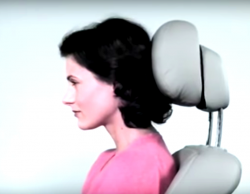
— A Mercedes-Benz class action lawsuit allegedly should be dismissed entirely because the four car owners who sued allegedly don't adequately plead their claims against the automaker.
The Mercedes class action lawsuit was filed by four plaintiffs who claim the NECK-PRO active headrests are defective because the activate head restraints allegedly deploy without crash impacts.
Mercedes-Benz has allegedly known for 10 years the headrests are defective but won't order a recall to fix the problems.
The Mercedes-Benz NECK-PRO will allegedly help prevent whiplash injuries in rear-end crashes as the padded headrest quickly moves forward as a person's head moves backward.
But the plaintiffs who sued claim the headrests were built with cheap plastic that break and trigger the head restraints to activate while driving.
The NECK-PRO headrests, manufactured by Grammer, allegedly contain plastic brackets which hold the spring-loaded releases until sensors send signals of rear-end collisions. However, the class action alleges the springs put a constant load on the plastic brackets which cause the brackets to break.
According to the plaintiffs, Mercedes allegedly took the cheap way out by using the cheap plastic that cannot handle the constant pressure from the springs.
The class action lawsuit further alleges hundreds of thousands of Mercedes vehicles are equipped with defective NECK-PRO headrests, placing occupants in danger of impacts to their heads without warning.
Motion to Dismiss the Mercedes Class Action Lawsuit
According to Mercedes-Benz, the plaintiffs lack standing to pursue a class action lawsuit from any state other than California, New York or North Carolina because the owners did not suffer any damages outside of those three states.
The automaker also told the judge two out of four plaintiffs have no implied warranty claims if their cars were repaired and had no further problems.
"In short, if the car requires a repair and obtains it without further incident, it is not unmerchantable." — Mercedes motion to dismiss
Mercedes also says the plaintiffs fail to state claims for common law fraud because the lawsuit alleges hundreds, if not thousands, of consumers complained to the government and to Mercedes about the headrests. But then the lawsuit mentions only seven complaints sent to the National Highway Traffic Safety Administration.
In addition, the lawsuit provides five headrest complaints posted on a different website, and this is out of "hundreds of thousands" of Mercedes vehicles. "This is the antithesis of knowledge," alleges Mercedes-Benz.
Attorneys for Mercedes argue because the plaintiffs have not plausibly alleged the automaker knew of the alleged headrest defect at any point, much less when they purchased their cars, these claims must fail.
Mercedes-Benz also argues the plaintiffs have no Magnuson-Moss Warranty Act (MMWA) claim because the state warranty claims fail.
Because no plaintiff allegedly pleads a claim for breach of any express warranty and allegedly none of the non-California plaintiffs plead an implied warranty claim, any other MMWA claims allegedly fail.
The automaker also argues even if the two non-California plaintiffs had pled state warranty claims, none would be viable because their cars were ten and twelve years old when the NECK-PRO class action lawsuit was filed, so the four-year, 50,000-mile warranties (both express and implied) had already expired.
Additionally, the MMWA claims allegedly fail no matter what because the “text is clear that a requirement for an MMWA class action in federal court is at least one hundred named plaintiffs.”
The Mercedes-Benz class action lawsuit was filed in the U.S. District Court for the Northern District of Georgia: Monopoli, et al., v. Mercedes-Benz USA, LLC, et al.
The plaintiffs are represented by Caplan Cobb LLP, Kozyak Tropin & Throckmorton LLP, Searcy Denney Scarola Barnhart & Shipley PA, Podhurst Orseck, P.A., Santiago Burger LLP, and Law Office of George Franjola.




